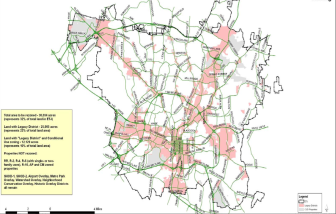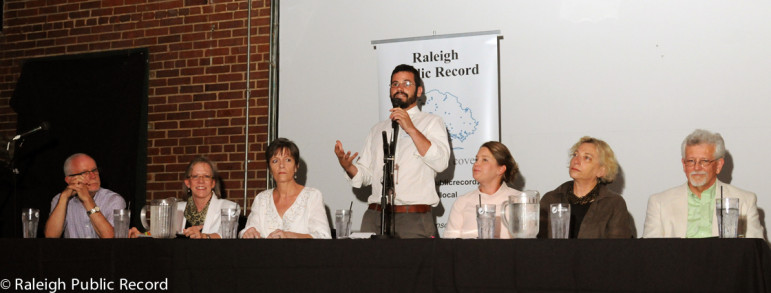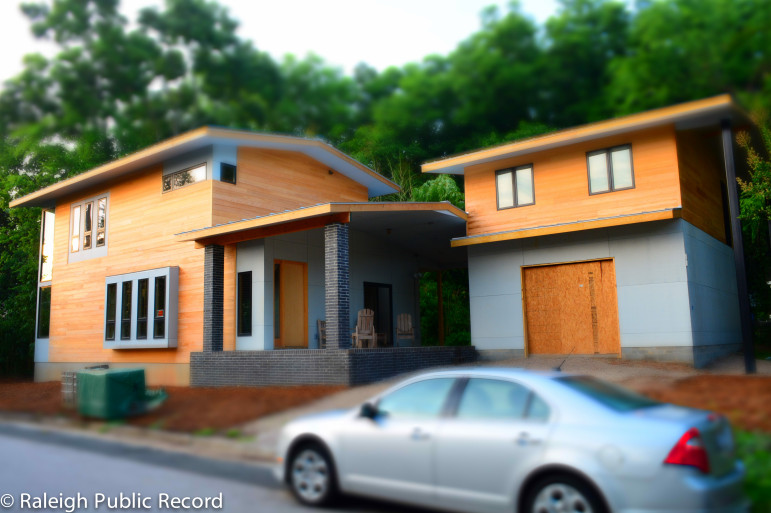The UDO’s oft-derided lack of specificity in the text is by design, according to some city staff.
Following a series of complaints leveled against the Unified Development Ordinance, city staff were given the opportunity at last week’s Comprehensive Planning Committee to respond to a some of the issues raised.
“It’s written in such a way to allow City Council and the Planning Commission to use independent judgment,” when considering various rezoning and land-use cases, said Travis Crane, the city’s Planning and Zoning administrator.

Image provided by City of Raleigh
A map showing the areas that will be changed for the UDO, with legacy districts shown in pink.
Much of the discussion was focused on the land-use category Neighborhood Mixed Use, and whether it should allow for the construction of a Publix in north Raleigh on Falls of Neuse.
The NMU designation is intended for developments that service a one-mile radius area that would allow for drug stores, dry cleaners and supermarkets. Opponents of the Publix development argued that the store, by industry definition, would not be classed as a supermarket, but rather as a super-store, which is defined by the Food Marketing Institute as any grocery store larger than 30,000 square feet.
The Publix is currently planned to come in at about 50,000 square feet, which neighbors argue would draw in significant vehicle traffic, going against the NMU’s goal of creating pedestrian-oriented districts.
At a time when a large swath of southeast Raleigh residents are living in a federally recognized danger zone known as a food desert due to a lack of grocery stores, it may seem strange to complain about an overabundance of supermarkets. However, as with the protests against a certain Hillsborough Street development, the underlying issue is not so much about any one individual project, but rather the overall direction new development will take under the UDO.
Councilor Bonner Gaylord acknowledged that the city will likely experience some “growing pains” over the coming months and said he views the recent wave of complaints as a good sign for the city as a whole.
“This is reflective of something positive,” Gaylord said. “People want to invest in their community, and people want to protect their investment in the community.”
Happening Now-Ish
Downtowners looking to see a man about a dog will soon have a new option in the form of Tasty 8’s Gourmet Hot Dogs, to be located in the Alexander Square development on Fayetteville Street. The $100,000 fit-out of the former home of Spize Café will be handled by Angle Contractors, which also did the work for Glenwood South’s Noir Bar & Lounge.
According to the Facebook page for Tasty 8’s – so named because it will offer eight types each of hot dogs, beers, shakes and dipping sauces – the restaurant is scheduled to open on or about July 4.
Hillsborough Street institution Edible Art Bakery & Café will soon be relocating from its downtown home to a new, midtown location at the North Hills shopping center. If everything stays on schedule, the bakery will be open in its new spot this fall.
Creedmoor Medical Center will soon be welcoming a new addition to their roster in the form of Dr. Bain, as permits for the $378,760 fit-out of his office were issued last week. It is unknown at this time whether the good doctor merely adopted the medical profession or was born into it, molded by it. Completely unfounded rumors have the doctor repeatedly telling patients that he will show them where he has made his home while preparing to bring medical care. Then he will heal them.
After writing this paragraph, I wrote the following note to my film-challenged editor: This is a reference to The Dark Knight Rises, the villain of which is named Bane. I ripped off a speech he made and put in slightly different words (heal instead of break, etc.) While not a very good movie, it was pretty successful so I’m not sure if it needs explaining.
Editor’s response: I did see the movie—it was not very good. And no, I didn’t get the reference. We mean no disrespect to Dr. Bane, but apparently we have number of movie nerds in the audience.
Correction: The preceding paragraph said Raleigh Public Record has “movie nerds” in the audience. We, in fact, only have “movie buffs” in the audience. The only “movie nerds” are the ones on staff.
Not to be outdone, the offices of Maxim Healthcare subsidiary Raleigh Home Health Accredited, located in the corporate center at 5510 Six Forks Road, is undergoing a $40,000 renovation of its own. As its corporate parent is in no way associated with the men’s magazine of the same name, it’s doubtful that patients will be exposed to a mix of dirty jokes and photos of scantily clad D-list celebrities as part of their treatment.
Coming Soon (Or Not)
City Council this week held the long-awaited, final public hearing for zoning case Z-33-2013, which would allow for an AutoZone on what is currently a residential parcel at 4130 Western Boulevard. All the usual suspects were there. Attorney Thomas Worth, on behalf of the applicant; adjacent property owner and former City Council candidate Jerome Goldberg, on behalf of himself. After some brief discussion, the Council voted against allowing the case to move forward.
The second case, Z-2-14, a seven-story, 24-unit student apartment complex with ground-floor retail on Hillsborough Street across from NC State’s DH Hill library, has also been the source of much debate.

James Borden / Raleigh Public Record
All of the Councilors had something to say – mostly that they were conflicted, largely due to the building exceeding the area’s 5-story maximum. Councilors Baldwin, Gaylord, Odom, Weeks and Mairano all voted in favor of the project, saying it was hard to turn down the kind of density the development would offer in the transit corridor.
Mayor McFarlane and councilors Crowder and Stephenson all voted against it, with Crowder arguing it would set a “very bad precedent,” and McFarlane saying the same density benefits would be provided with five stories. Councilors need a two-thirds majority to pass an ordinance on first reading, so there will be another reading at the next meeting.
Raleigh Talks
Distinguished by a disappointing lack of fist-fights, chair-throwing and chants of “Charles! Charles! Charles!” the Raleigh Public Record’s first-ever Raleigh Talks event, moderated by Record founder Charles Duncan, drew a significant crowd Wednesday to downtown’s Tir Na Nog.

Karen Tam / Raleigh Public Record
Editor Charles Duncan kicks off the first Raleigh Talks event Wednesday at Tir Na Nog.
Using the controversial “Modern Oakwood” house as a jumping-off point, the panel discussion featured speakers offering perspectives on both sides of the issue, and explored a variety of subjects related to new infill development in historic neighborhoods.
Although the house in question complained via Twitter about its lack of an invite to speak on the panel, those that spoke in favor of its construction, such as Preservation North Carolina’s Myrick Howard, made a number of compelling arguments as to why historic neighborhoods should allow for the type of development that many see as non-conforming. These new homes, it was argued, add and contribute to the character of said neighborhoods, rather than take away from them.

James Borden / Raleigh Public Record
Those on the other side of the issue, such as Mary Iverson, president of the Oak City Preservation Alliance, argued that state statutes regarding development in designated historic districts, which require adherence to certain architectural styles, supersede local regulations, which are less specific. Concerns were also raised that by allowing too much modern development, the neighborhood may lose its historical designation.
While a number of the panelists engaged in an effective method of non-verbal communication known as “rolling your eyes,” the discussion remained mostly civil, free of kind of the rhetoric found in most discussions about the house. Which, by the way, is much bigger in person than it looks in pictures.
